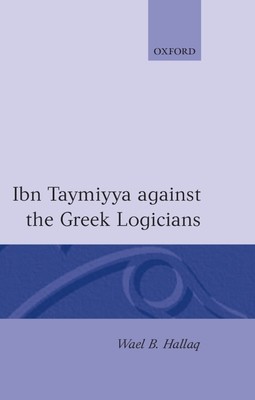
- We will send in 10–14 business days.
- Publisher: Clarendon Press
- Year: 2021
- ISBN-10: 0198240430
- ISBN-13: 9780198240433
- Format: 14.6 x 22.4 x 2.6 cm, hardcover
- Language: English
- SAVE -10% with code: EXTRA
Ibn Taymiyya Against the Greek Logicians (e-book) (used book) | bookbook.eu
Reviews
Description
Ibn Taymiyya, one of the greatest and most prolific thinkers of medieval Islam, held Greek logic responsible for the "heretical" metaphysical conclusions reached by Islamic philosophers, theologians, mystics, and others. Unlike Ghazali, who rejected philosophical metaphysics but embraced logic, Ibn Taymiyya considered the two inextricably connected. He therefore set out to refute philosophical logic, a task which culminated in one of the most devastating attacks ever levelled against the logical system upheld by the early Greeks, the later commentators, and their Muslim followers. His argument is grounded in an empirical approach that in many respects prefigures the philosophies of the British empiricists. Hallaq's translation, with a substantial introduction and extensive notes, makes available to a wider audience for the first time an important work that will be of interest to specialists in ancient and medieval philosophy and to historians of logic and empiricist philosophy,
as well as to scholars of Islam and Middle Eastern thought.
EXTRA 10 % discount with code: EXTRA
The promotion ends in 15d.09:12:28
The discount code is valid when purchasing from 10 €. Discounts do not stack.
- Publisher: Clarendon Press
- Year: 2021
- ISBN-10: 0198240430
- ISBN-13: 9780198240433
- Format: 14.6 x 22.4 x 2.6 cm, hardcover
- Language: English English
Ibn Taymiyya, one of the greatest and most prolific thinkers of medieval Islam, held Greek logic responsible for the "heretical" metaphysical conclusions reached by Islamic philosophers, theologians, mystics, and others. Unlike Ghazali, who rejected philosophical metaphysics but embraced logic, Ibn Taymiyya considered the two inextricably connected. He therefore set out to refute philosophical logic, a task which culminated in one of the most devastating attacks ever levelled against the logical system upheld by the early Greeks, the later commentators, and their Muslim followers. His argument is grounded in an empirical approach that in many respects prefigures the philosophies of the British empiricists. Hallaq's translation, with a substantial introduction and extensive notes, makes available to a wider audience for the first time an important work that will be of interest to specialists in ancient and medieval philosophy and to historians of logic and empiricist philosophy,
as well as to scholars of Islam and Middle Eastern thought.


Reviews